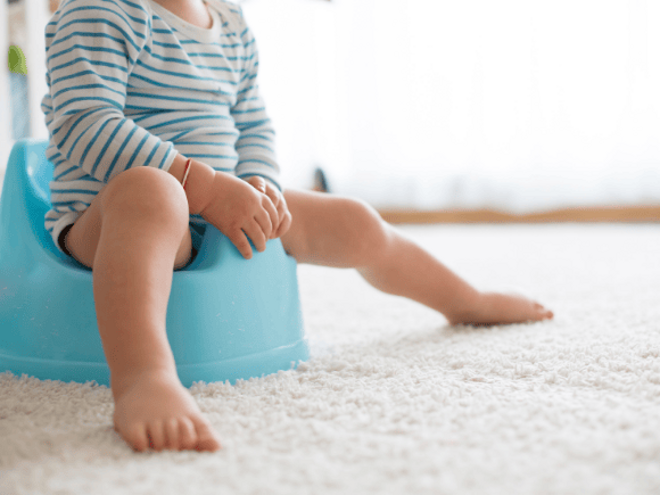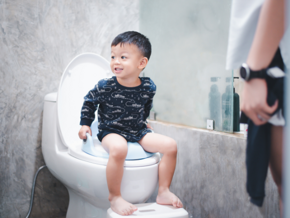
What To Do When You Have a Constipated Toddler
Your toddler may poo once a day or once every few days. This article explains the possible causes of constipation in children and how to help alleviate it.
Constipation in children
Childhood constipation is not always how often your toddler does a poo, but what it comes out like. Signs and symptoms of toddler constipation:
- Hard, pebble-like poo;
- Poo is painful to pass;
- Poo is infrequent – Frequency varies for each toddler and some may go 2-3 times per day and for some it’s normal to go every 2-3 days. If your child hasn’t had a motion for a week then it may be time to seek advice from your doctor;
- Frequent small amounts of runny poo that slips out without your toddler knowing. It can be poo seeping around a larger mass in the bowel. This can be seen as ‘skiddies’ on their undies or accidents;
- Your toddler may be irritable, refuses food and complains of a sore stomach.
Possible causes of toddler constipation:
- Lack of physical activity;
- Poor diet with not enough fresh fruit and vegetables;
- Excessive amounts of cow’s milk and not enough solid food can result in less fibre in the diet;
- Holding poo in for long periods. This may occur if at any time it has been uncomfortable or unpleasant for them to poo. It may have been from being teased, pain, lack of privacy, embarrassment, smelly toilets, or simply too busy to stop. Holding on causes the bowel to swell and become less functional;
- Food intolerances;
- An unbalanced microflora;
- Poor water and fluid consumption.
How to help alleviate toddler constipation:
- Ensure your toddler is receiving a healthy balanced diet, full of whole grain cereals, fresh fruit and vegetables. Limit their intake of foods high in salt or sugar;
- Encourage daily physical activity and play;
- Encourage regular toilet sitting about three times per day after meals;
- Ensure they are getting plenty of water over the day;
- There are oral supplements which may assist with constipation, always seek medical advice before trying these methods. Healthy diet and exercise should always be the first option.
Seek health care professional advice if your toddler’s poo doesn’t stay soft and regular, or they haven’t passed a poo in a week. There may be an underlying cause.
Frequently asked questions about toddler constipation
How to help toddler with constipation
To help your toddler’s constipation, ensure they are drinking plenty of water throughout the day to stay hydrated. Incorporate high-fibre foods into their diet, such as fresh fruits (like pears and apples), vegetables, and whole grains. Encourage regular bathroom habits by setting aside time after meals for them to sit on the toilet. Gentle abdominal massages and physical activity can also promote movement through the digestive tract. If constipation persists and your toddler has not gone to the toilet in a week, consult your healthcare professional for further advice and potential treatment options.
When should I be concerned about my toddler's constipation?
While having a constipated toddler can be worrying, childhood constipation is fairly common and in most instances it won’t last long or have any serious consequences. You should seek immediate medical advice if your toddler’s poo is white, red, or black in colour. Also, if fever and vomiting is experienced at the same time, or they stop eating or drinking.
What drink helps toddler poop?
To help a toddler with constipation, offering regular drinks of water during the day is important. Staying hydrated is so important and drinking water is the best way to achieve that. There are other drinks such as prune juice, or pear juice that have a natural laxative effect, however they should only be offered in small amounts and not as the main drink throughout the day as they contain a lot of natural sugar. Try diluting these juices with water if your toddler is not used to them. If issues persist, talk to your healthcare professional for more tailored advice.
What food helps toddlers poop?
Include foods that are high in fibre, such as fresh fruits and vegetables, and whole grain breads and cereals. In addition, ensure adequate hydration with drinks of water throughout the day.
Sources
- Health Direct Website. Accessed at Constipation in children | healthdirect
- Raising Children Website. Accessed at Constipation in babies and children | Raising Children Network


